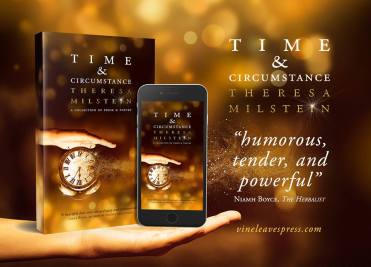I’ve known Theresa for ages now – although I can’t remember how or when we met. That’s usually how writers appear in my life, surreptitiously, hanging around my blog or Facebook when I’m lost in a series of scenes and popping up with useful advice. I’m delighted to have her on my blog to help celebrate the launch of her new book, Time & Circumstance, which I reviewed on Goodreads recently. Take it away, Theresa…
When Vine Leaves Literary Journal began to give a platform for the vignette, the first question I asked was, “What’s a vignette?” At that point, I’d written a few manuscripts and short stories for children and teens, and I’d taken several poetry workshops. My heart was in the novel. I’d only started submitting short stories because I’d heard it was a good way to gain writing experience and it gave me a few publishing credits. The poetry workshops became a creative outlet, but I hadn’t taken it seriously.
Vine Leaves rejected my first submission, which was all telling and not at all a vignette. I read their first issue. There, I truly got the idea that a vignette is a moment in time captured. Vine Leaves accepted my second, a prose piece. The third time I submitted a poem, and it was accepted.
I became a regular vignette writer. I’d write because something impacted me, and the only way to come to terms with it was to say something about it in a small space. I’ve found that vignettes fill the void when I’m letting a full-length manuscript sit. There was one blog I turned to regularly for inspiration. It no longer posts, and I miss it. I’ve learned that I’m a competitive person: give me a picture prompt and a phrase of some sort, and I’m typing away. Several years later, I’d accumulated enough vignettes to make a collection.
I’ve been asked what determines if a piece of writing becomes poetry or prose. Often the first line directs me. If it’s lyrical, and I sense a rhythm in the next line, it becomes a poem. I wind up with many more poems than prose. But if the subject needs more freedom than the space a poem will take, prose works better for me. I know there are people who write poetry with long lines or that go on for many pages. I recently went to a poetry reading, and the woman recited her poem for about fifteen minutes. That’s not my style.
When editing my vignette collection with Vine Leaves Press, I appreciated the editor’s perspective. Several of my poems became prose poems, which is a poem that appears as prose. So, sometimes what works best for my writing is a compromise between the two forms!
 Theresa Milstein writes middle grade and YA, but poetry is her secret passion. Her vignette collection, TIME & CIRCUMSTANCE, will be published by Vine Leaves Press in March 21, 2017. She lives near Boston Massachusetts with her husband, two children, a dog-like cat, and a cat-like dog. For her day job, she works as a special education teacher in a public school, which gives her ample opportunity to observe teens and tweens in their natural habitat.
Theresa Milstein writes middle grade and YA, but poetry is her secret passion. Her vignette collection, TIME & CIRCUMSTANCE, will be published by Vine Leaves Press in March 21, 2017. She lives near Boston Massachusetts with her husband, two children, a dog-like cat, and a cat-like dog. For her day job, she works as a special education teacher in a public school, which gives her ample opportunity to observe teens and tweens in their natural habitat.

TIME & CIRCUMSTANCE is available for preorder.
$3.99 AUD (eBook)
Kindle AUS
Kindle US
Kindle UK
Kindle CA
iBooks | Kobo | Nook
$12.99 AUD (paperback)
Amazon US
Amazon UK
Amazon CA
Barnes & Noble
Book Depository
Chapters Indigo
Leave a comment, and you’re eligible to win a prize during my blog tour!
1 $25 Amazon gift card
1 signed paperback copy
1 ebook
Answer the question:
“If you could relive any moment in time, what would it be?”
Extra entries if you share on Facebook or Twitter and link it to me.
@TheresaMilstein on Twitter.
@Theresa Milstein on Facebook
#ReliveMoment or #TimeandCircumstance
Winners will be announced on April 5, 2017

Congratulations, Theresa!
I don’t think any of mine would turn into poetry, but I like the idea of writing something short that captures a moment.
LikeLike
Thanks, Alex. We all have different writing styles. I have never come up with an idea for a murder mystery or horror. I did one science fiction short story, but I really pushed myself.
LikeLike
Perhaps we should both give poetry a try?
LikeLike
It gives me a good brain break between projects, and distracts me from looking at the same manuscript over and over when it’s supposed to be resting or with other readers.
LikeLike
Thank you very much to Annalisa for hosting me. And thanks so much for the book for the book review! I can’t remember when I met you officially either. Must’ve been blogging because I knew you before your submission of You. I. Us. to Vine Leaves.
LikeLike
You’re very welcome. Yes, I think I knew you for quite a while before that submission.
LikeLike
I don’t think there’s anything more poignant than poetry. Wishing you much success.
Hi, Annalisa.
LikeLike
Hi Sandra 🙂 I’m a little ashamed to admit I don’t read much poetry – Theresa’s collection was definitely the first in a long time.
LikeLike
Thank you, Sandra!
LikeLike
Hi Annalisa and Theresa – no idea when I met you both …but probably via one of the A-Z Challenges – the way many of us meet … but I love that you can just write and get your work out and published … Time and Circumstance seems an ideal title for your vignette – good luck with the spread and sales: it will happen for you both … cheers Hilary
LikeLike
Yes, the A-Z challenge sounds likely – I definitely picked up a lot of blogs to follow my first time.
LikeLike
Hilary, I’m sure I met your through A to Z–you’re brilliant at those post themes. Thank you!
LikeLike
That’s a gift you can write in both prose and poetry.
LikeLike
I’ve dabbled with poetry, but very badly!
LikeLike
Thank you. I definitely feel more confident about my prose, but I love to experiment with poetry.
LikeLike
Such an amazing cover! Love it! I also enjoyed the explanation of what defines a piece as poetry or prose.
As for a moment I would like to relive- I am not sure. So many wonderful moments. Maybe reading Harry Potter for the first time. I love rereading it, but it would be amazing to read it with the same surprise and awe I had that very first time. 🙂
Best of luck to Theresa!
LikeLike
Oh yes, I remember when I first read Harry Potter – I was lucky, my in-laws bought the first 4 for my son so I was able to read them in very quick succession 🙂
LikeLike
Stephanie, I’m with you on Harry Potter! When people tell me they’re reading for the first time, I say, “I envy you.”
LikeLike
Congrats to Theresa! Also fascinating to read about her writing process. A vignette is something I have yet to master. I’d also never heard of prose poems – intriguing. Relive a moment in time? I’d have to say the moment my daughter was born (although my wife may disagree!) I was trying to capture it on camera and my phone chose that moment to die, so I didn’t appreciate it properly.
LikeLike
Oh, what bad timing for the phone – well, from your point of view. From your wife’s, maybe not so much 🙂
LikeLike
Nick, thank you. A prose poem is in paragraph form, but it has a rhythm like a regular poem. The paragraph sort of speeds up the reading, and the short lines make it snappier.
That sounds like a great moment to relive (I’d skip the pain part personally)–looks like you need a do-over with a fresh battery!
LikeLike
I like the title, cover, and concept. And I understand how sometimes a poem works, other times a story. And I’ve converted or transformed either way also. I think the word vignette is descriptive – just a dabble of a moment, almost like a picture in a frame. Good luck with sales and promoting your work. You are on your way with an appearance on Annalisa’s lovely blog.
LikeLike
Hi Joanne, yes you have a good understanding of the similarities and differences between poetry and prose. Vignette is a fantastic word, isn’t it?
LikeLike
Joanne, I agree with Annalisa–that’s a good description of the vignette. Thank you!
LikeLike
Hi, Theresa and Annalisa, I’m pretty sure we met on Vine Leaves Press Staff and Authors FB page. This is such a great little post, Theresa, and I think you nailed the definition of a vignette. I’ve been writing fiction, a bit of poetry, and novellas for some time now, and I love your definition, if I got it right, a moment in time. I kind of thought of vignettes before in this manner, and for me kind of like tiny character sketches since I’m more character than plot centered in my writing. I can’t wait to read your book and find out more about vignettes. Hi to Alex. (We know each other from Anne R. Allen’s Writers blog. My best to all, Paul
LikeLike
Hi Paul, thanks for visiting. Vignettes are such fun to write!
LikeLike
Paul, you really do try different types of writing! Delving into character through a vignette is definitely an interesting way to write a vignette. I used to be focused on beginning, middle, and end. Now it’s nice to explore character or mood or setting and just linger there a while.
LikeLike
Yay! Hello Theresa! Tour away. Loving the post and insight. I’ve never analyzed poetry vs prose like that, but it’s totally true.
LikeLike
It’s interesting how the two can be so similar – I always thought poetry was far beyond me 🙂
LikeLike
Hi, Crystal. You’re the touring expert–I should’ve consulted with you!
LikeLike
I only understand vignette as a photography term – but I’m no poet.
LikeLike
That’s actually a good analogy – a vignette can be a moment in time captured, like a photo.
LikeLike
Patsy, it’s a similar idea–like a snapshot.
LikeLike
I somehow missed that Annalisa said the same thing already!
LikeLike
I love the thought of “vignettes filling the void while a full-length manuscript sits.” Perfect! It renews my interest in vignettes. Good luck, Theresa.
LikeLike
Vignettes are fun to read and write – so much emotion can be poured into so few words 🙂
LikeLike
Thank you, Seliza. I hope you write some vignettes in between projects.
LikeLike
It’s a beautiful and emotional book. Theresa is such a skilled author!
LikeLike
Yes, I agree 🙂
LikeLike
Thank you so much, Sharon.
LikeLike
Thanks again for hosting me, Annalisa. I’ve shared the winners on my blog.
LikeLike